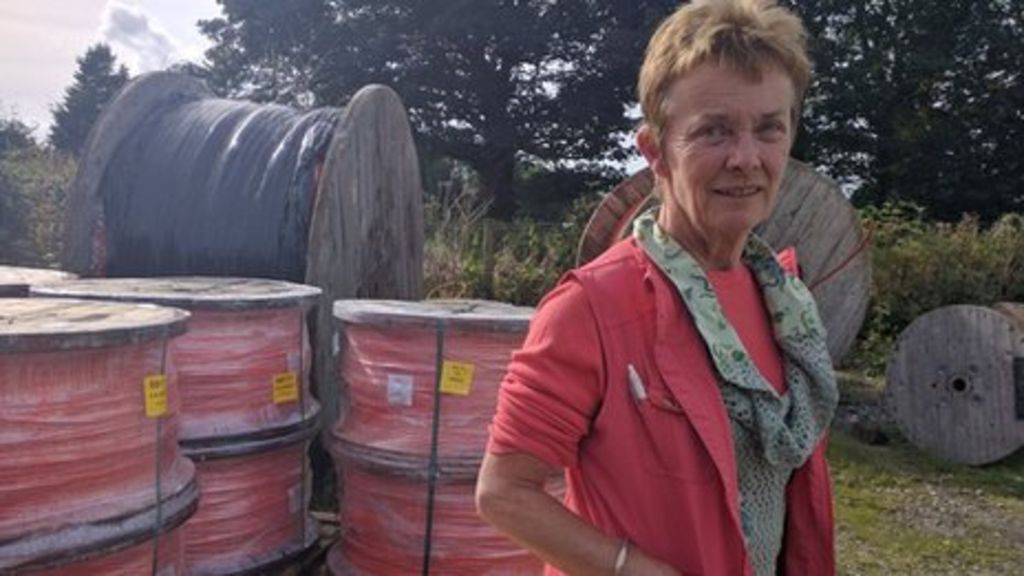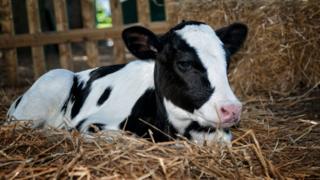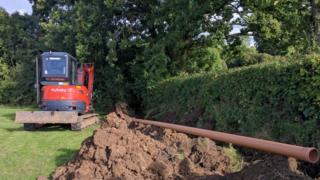The farmer who built her own broadband – BBC News

“I’m just a farmer’s wife,” says Christine Conder, modestly. But for 2,300 members of the rural communities of Lancashire she is also a revolutionary internet pioneer.
Her DIY solution to a neighbour’s internet connectivity problems in 2009 has evolved into B4RN, an internet service provider offering fast one gigabit per second broadband speeds to the parishes which nestle in the picturesque Lune Valley.
That is 35 times faster than the 28.9 Mbps average UK speed internet connection according to Ofcom.
It all began when the trees which separated Chris’s neighbouring farm from its nearest wireless mast – their only connection to the internet, provided by Lancaster University – grew too tall.
Something more robust was required, and no alternatives were available in the area, so Chris decided to take matters into her own hands.
She purchased a kilometre of fibre-optic cable and commandeered her farm tractor to dig a trench.
After lighting the cable, the two farms were connected, with hers feeding the one behind the trees.
“We dug it ourselves and we lit [the cable] ourselves and we proved that ordinary people could do it,” she says.
“It wasn’t rocket science. It was three days of hard work.”
Her motto, which she repeats often in conversation, is JFDI. Three of those letters stand for Just Do It. The fourth you can work out for yourself.
 Image copyright BBC/Zoe Kleinman
Image copyright BBC/Zoe Kleinman And JFDI she has.
B4RN now claims to have laid 2,000 miles (3,218km) of cable and connected a string of local parishes to its network. It won’t connect a single household, so the entire parish has to be on board before it will begin to build.
Each household pays 30 per month with a 150 connection fee and larger businesses pay more. Households must also do some of the installation themselves.
The entire infrastructure is fibre-optic cable right to the property, rather than just to the cabinet, with existing copper phone lines running from that to the home, as generally offered by British Telecom.
The service is so popular that the company has work lined up for the next 10 years and people from as far as Sierra Leone have attended the open days it holds a couple of times a year.
The bulk of the work is done by volunteers, although there are now 15 paid staff also on board. Farmers give access to their land and those with equipment like diggers and tractors do the heavy work.
However other landowners can charge – B4RN has complained on its Facebook page about the price of cabling under a disused railway bridge owned by Highways England.
A spokesperson told the BBC these are “standard industry costs” which include a 4,500 fee for surveying, legal fees and a price per metre for the cable installation.
While B4RN has yet to make a profit, once it has paid back its shareholders it should be in good financial health – although one of the conditions is that profits must be ploughed back into the community.
Chris’s services to rural broadband have recognised by the Queen – she was awarded an MBE in 2015, alongside Barry Forde, a retired university lecturer who now leads the co-operative.
 Image copyright Thinkstock
Image copyright Thinkstock Incredibly, many B4RN customers had been surviving on dial-up services or paying high fees for satellite feeds. Chris says that some still are.
With farmers having to register online with the Department for Environment, Food and Rural Affairs (Defra) within five days of every calf being born in order for it to enter the food chain, connectivity is vital.
“All the farmers who haven’t got broadband have to rely on land agents or auction marts or public wi-fi spaces which we haven’t got round here either, or paying somebody to do it,” says Chris.
“What the farmers were finding was the dial-up just couldn’t cope with it.
“They bought satellites, but then the children would use all the satellite feed to do their things and then they came to use it at night and there was no feed left, they’d gone over the data and they were being charged a fortune for what they then used.
“So the farmers have been incredibly supportive of this and that’s why they’ve given us free rein throughout the fields, which we go through to connect them and then we get to the villages which subsidise the farmers’ connections.
“You couldn’t do it just for the farmers alone, but you couldn’t get to the village without the farmers so it’s tit for tat.”
 Image copyright BBC/Zoe Kleinman
Image copyright BBC/Zoe Kleinman There are other independent fibre broadband providers out there, like Gigaclear which serves around 50,000 customers based in several UK counties and Hyperoptic which is active in 13 cities. They all claim to offer 1Gbps speeds.
“The best way to make sure this country catches up is to support the alternative networks,” says Chris.
“Wherever there’s competition BT will then up their game.
“We can’t do the whole country. [BT, Virgin etc] are good businesses. They are in it to make a profit, that’s what businesses are supposed to do.”
Openreach, currently a division of BT, owns the UK’s largest broadband infrastructure.
“The big picture is that we’ve got a plan, alongside the government, to get to 95% UK fibre coverage,” said Kim Mears, Openreach’s managing director of Infrastructure Delivery.
The provider has also upgraded 90 small communities through its Community Fibre Partnership, set up to work in areas it describes as “hard to reach”.
Ms Mears appealed to those struggling with poor connectivity to make contact.
“There is lots available if communities come together. We are really sitting here waiting to help,” she said.